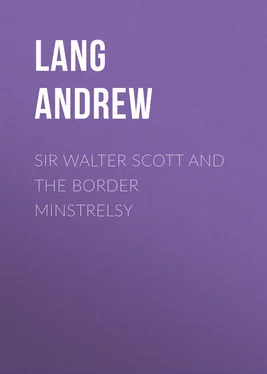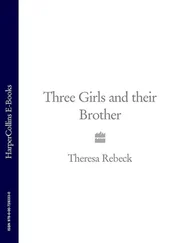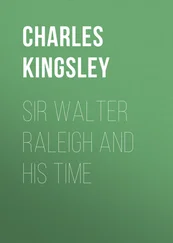Andrew Lang - Sir Walter Scott and the Border Minstrelsy
Здесь есть возможность читать онлайн «Andrew Lang - Sir Walter Scott and the Border Minstrelsy» — ознакомительный отрывок электронной книги совершенно бесплатно, а после прочтения отрывка купить полную версию. В некоторых случаях можно слушать аудио, скачать через торрент в формате fb2 и присутствует краткое содержание. Жанр: foreign_antique, foreign_prose, на английском языке. Описание произведения, (предисловие) а так же отзывы посетителей доступны на портале библиотеки ЛибКат.
- Название:Sir Walter Scott and the Border Minstrelsy
- Автор:
- Жанр:
- Год:неизвестен
- ISBN:нет данных
- Рейтинг книги:5 / 5. Голосов: 1
-
Избранное:Добавить в избранное
- Отзывы:
-
Ваша оценка:
- 100
- 1
- 2
- 3
- 4
- 5
Sir Walter Scott and the Border Minstrelsy: краткое содержание, описание и аннотация
Предлагаем к чтению аннотацию, описание, краткое содержание или предисловие (зависит от того, что написал сам автор книги «Sir Walter Scott and the Border Minstrelsy»). Если вы не нашли необходимую информацию о книге — напишите в комментариях, мы постараемся отыскать её.
Sir Walter Scott and the Border Minstrelsy — читать онлайн ознакомительный отрывок
Ниже представлен текст книги, разбитый по страницам. Система сохранения места последней прочитанной страницы, позволяет с удобством читать онлайн бесплатно книгу «Sir Walter Scott and the Border Minstrelsy», без необходимости каждый раз заново искать на чём Вы остановились. Поставьте закладку, и сможете в любой момент перейти на страницу, на которой закончили чтение.
Интервал:
Закладка:
Andrew Lang
Sir Walter Scott and the Border Minstrelsy
Persons not much interested in, or cognisant of, “antiquarian old womanries,” as Sir Walter called them, may ask “what all the pother is about,” in this little tractate. On my side it is “about” the veracity of Sir Walter Scott. He has been suspected of helping to compose, and of issuing as a genuine antique, a ballad, Auld Maitland . He also wrote about the ballad, as a thing obtained from recitation, to two friends and fellow-antiquaries. If to Scott’s knowledge it was a modern imitation, Sir Walter deliberately lied.
He did not: he did obtain the whole ballad from Hogg, who got it from recitation – as I believe, and try to prove, and as Scott certainly believed. The facts in the case exist in published works, and in manuscript letters of Ritson to Scott, and Hogg to Scott, and in the original MS. of the song, with a note by Hogg to Laidlaw. If we are interested in the truth about the matter, we ought at least to read the very accessible material before bringing charges against the Sheriff and the Shepherd of Ettrick.
Whether Auld Maitland be a good or a bad ballad is not part of the question. It was a favourite of mine in childhood, and I agree with Scott in thinking that it has strong dramatic situations. If it is a bad ballad, such as many people could compose, then it is not by Sir Walter.
The Ballad of Otterburne is said to have been constructed from Herd’s version, tempered by Percy’s version, with additions from a modern imagination. We have merely to read Professor Child’s edition of Otterburne , with Hogg’s letter covering his MS. copy of Otterburne from recitation, to see that this is a wholly erroneous view of the matter. We have all the materials for forming a judgment accessible to us in print, and have no excuse for preferring our own conjectures.
“No one now believes,” it may be said, “in the aged persons who lived at the head of Ettrick,” and recited Otterburne to Hogg. Colonel Elliot disbelieves, but he shows no signs of having read Hogg’s curious letter, in two parts, about these “old parties”; a letter written on the day when Hogg, he says, twice “pumped their memories.”
I print this letter, and, if any one chooses to think that it is a crafty fabrication, I can only say that its craft would have beguiled myself as it beguiled Scott.
It is a common, cheap, and ignorant scepticism that disbelieves in the existence, in Scott’s day, or in ours, of persons who know and can recite variants of our traditional ballads. The strange song of The Bitter Withy , unknown to Professor Child, was recovered from recitation but lately, in several English counties. The ignoble lay of Johnny Johnston has also been recovered: it is widely diffused. I myself obtained a genuine version of Where Goudie rins , through the kindness of Lady Mary Glyn; and a friend of Lady Rosalind Northcote procured the low English version of Young Beichan , or Lord Bateman , from an old woman in a rural workhouse. In Shropshire my friend Miss Burne, the president of the Folk-Lore Society, received from Mr. Hubert Smith, in 1883, a very remarkable variant, undoubtedly antique, of The Wife of Usher’s Well . 1 1 Child, part vi. p. 513.
In 1896 Miss Backus found, in the hills of Polk County, North Carolina, another variant, intermediate between the Shropshire and the ordinary version. 2 2 Child, part x. p. 294.
There are many other examples of this persistence of ballads in the popular memory, even in our day, and only persons ignorant of the facts can suppose that, a century ago, there were no reciters at the head of Ettrick, and elsewhere in Scotland. Not even now has the halfpenny newspaper wholly destroyed the memories of traditional poetry and of traditional tales even in the English-speaking parts of our islands, while in the Highlands a rich harvest awaits the reapers.
I could not have produced the facts, about Auld Maitland especially, and in some other cases, without the kind and ungrudging aid, freely given to a stranger, of Mr. William Macmath, whose knowledge of ballad-lore, and especially of the ballad manuscripts at Abbotsford, is unrivalled. As to Auld Maitland , Mr. T. F. Henderson, in his edition of the Minstrelsy (Blackwood, 1892), also made due use of Hogg’s MS., and his edition is most valuable to every student of Scott’s method of editing, being based on the Abbotsford MSS. Mr. Henderson suspects, more than I do, the veracity of the Shepherd.
I am under obligations to Colonel Elliot’s book, as it has drawn my attention anew to Auld Maitland , a topic which I had studied “somewhat lazily,” like Quintus Smyrnæus. I supposed that there was an inconsistency in two of Scott’s accounts as to how he obtained the ballad. As Colonel Elliot points out, there was no inconsistency. Scott had two copies. One was Hogg’s MS.: the other was derived from the recitation of Hogg’s mother.
This trifle is addressed to lovers of Scott, of the Border, and of ballads, et non aultres .
It is curious to see how facts make havoc of the conjectures of the Higher Criticism in the case of Auld Maitland . If Hogg was the forger of that ballad, I asked, how did he know the traditions about Maitland and his three sons, which we only know from poems of about 1576 in the manuscripts of Sir Richard Maitland? These poems in 1802 were, as far as I am aware, still unpublished.
Colonel Elliot urged that Leyden would know the poems, and must have known Hogg. From Leyden, then, Hogg would get the information. In the text I have urged that Leyden did not know Hogg. I am able now to prove that Hogg and Leyden never met till after Laidlaw gave the manuscript of Auld Maitland to Hogg.
The fact is given in the original manuscript of Laidlaw’s Recollections of Sir Walter Scott (among the Laing MSS. in the library of the University of Edinburgh). Carruthers, in publishing Laidlaw’s reminiscences, omitted the following passage. After Scott had read Auld Maitland aloud to Leyden and Laird Laidlaw, the three rode together to dine at Whitehope.
“Near the Craigbents,” says Laidlaw, “Mr. Scott and Leyden drew together in a close and seemingly private conversation. I, of course, fell back. After a minute or two, Leyden reined in his horse (a black horse that Mr. Scott’s servant used to ride) and let me come up. ‘This Hogg,’ said he, ‘writes verses, I understand.’ I assured him that he wrote very beautiful verses, and with great facility. ‘But I trust,’ he replied, ‘that there is no fear of his passing off any of his own upon Scott for old ballads.’ I again assured him that he would never think of such a thing; and neither would he at that period of his life.
“‘Let him beware of forgery,’ cried Leyden with great force and energy, and in, I suppose, what Mr. Scott used afterwards to call the saw tones of his voice .”
This proves that Leyden had no personal knowledge of “this Hogg,” and did not supply the shepherd with the traditions about Auld Maitland.
Mr. W. J. Kennedy, of Hawick, pointed out to me this passage in Laidlaw’s Recollections , edited from the MS. by Mr. James Sinton, as reprinted from the Transactions of the Hawick Archæological Society, 1905.
SCOTT AND THE BALLADS
It was through his collecting and editing of The Border Minstrelsy that Sir Walter Scott glided from law into literature. The history of the conception and completion of his task, “a labour of love truly, if ever such there was,” says Lockhart, is well known, but the tale must be briefly told if we are to understand the following essays in defence of Scott’s literary morality.
Читать дальшеИнтервал:
Закладка:
Похожие книги на «Sir Walter Scott and the Border Minstrelsy»
Представляем Вашему вниманию похожие книги на «Sir Walter Scott and the Border Minstrelsy» списком для выбора. Мы отобрали схожую по названию и смыслу литературу в надежде предоставить читателям больше вариантов отыскать новые, интересные, ещё непрочитанные произведения.
Обсуждение, отзывы о книге «Sir Walter Scott and the Border Minstrelsy» и просто собственные мнения читателей. Оставьте ваши комментарии, напишите, что Вы думаете о произведении, его смысле или главных героях. Укажите что конкретно понравилось, а что нет, и почему Вы так считаете.









